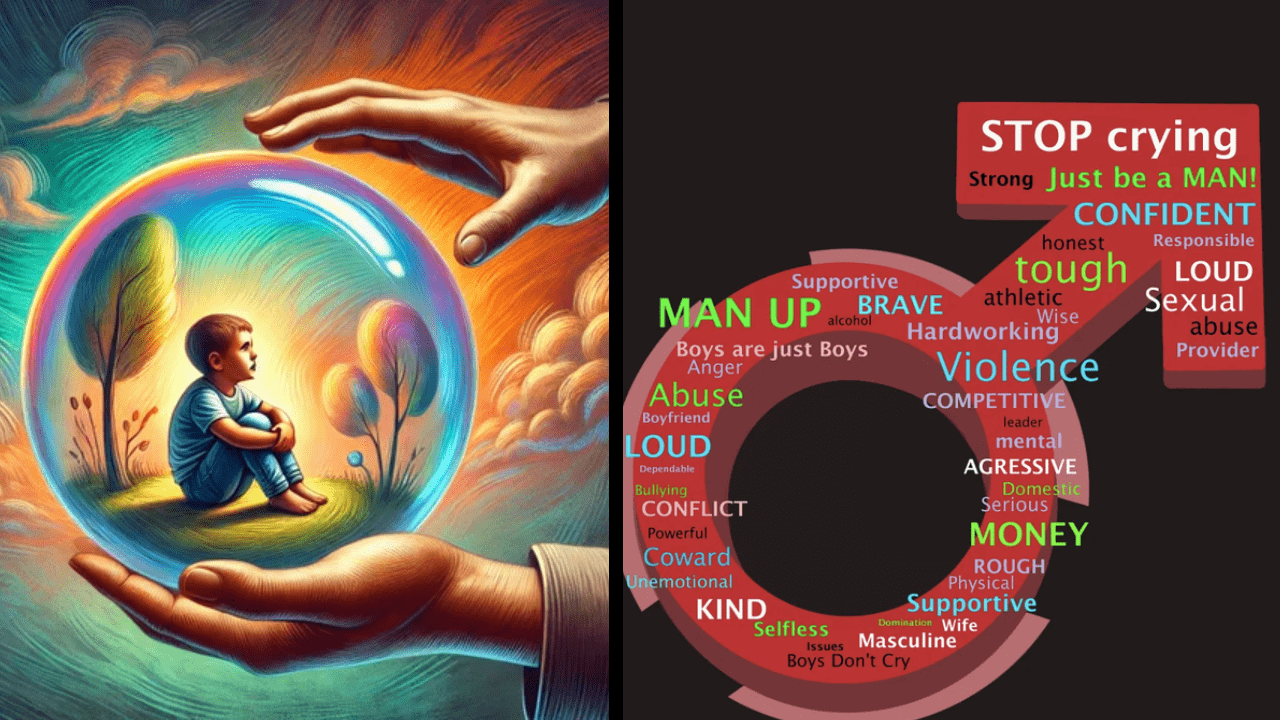Why are young men losing their manly traits? Is it the decline of traditional masculinity? Explore the societal, cultural, and psychological factors behind this shift, and what it means for masculinity in today’s world.

The concept of masculinity has undergone a seismic shift in recent decades. Traits once celebrated as the hallmark of being “manly” — physical strength, emotional stoicism, and the ability to shoulder familial responsibilities — seem to be fading among the younger generation. This shift has sparked debates about whether young men today lack “manliness” or if the definition of masculinity itself is evolving.
In this article, we’ll explore the reasons behind this perception, the societal changes driving it, and whether this transformation is a cause for concern or celebration.
The Traditional Image of Masculinity
Traditionally, masculinity was defined by roles and expectations deeply rooted in history and culture. A “manly” man was often seen as the protector, provider, and leader — someone who displayed physical strength, toughness, and an unwavering resolve in the face of adversity.
While this definition served its time, it also imposed rigid standards that left little room for emotional expression, individuality, or vulnerability. As the world changed, so did the expectations placed on men.
Redefining Masculinity in the Modern Era
- Societal Changes Reshaping Masculinity
One of the most significant reasons young men are perceived as less “manly” is the changing landscape of gender roles. Today’s society encourages men to embrace qualities like empathy, emotional intelligence, and collaboration — traits that were often sidelined in the traditional definition of masculinity.
For example, men are now more actively involved in parenting and household chores, roles previously considered “feminine.” While this evolution promotes equality and inclusivity, it can also lead to confusion for those trying to balance traditional expectations with modern realities.
The Impact of Technology and Media
- Social Media and Unrealistic Standards
Social media has become a double-edged sword for young men. While it provides a platform to express individuality, it also creates unrealistic standards for appearance, success, and behavior. Many young men feel pressure to fit into specific molds — whether it’s being hyper-masculine gym-goers or emotionally sensitive advocates of modern values.
This constant comparison often leads to insecurity, as they struggle to reconcile conflicting ideals.
- Shift in Media Representation
The way society perceives things is greatly influenced by the media. The rugged, stoic heroes of past decades have given way to more nuanced portrayals of men. Today’s male protagonists are often introspective, vulnerable, and emotionally complex, reflecting the evolving understanding of masculinity.
While this shift broadens representation, it also challenges the traditional benchmarks of “manliness” that many young men grew up with.

Parenting and Its Role in Shaping Masculinity
- The Absence of Male Role Models
Many young men today grow up in households where traditional male role models are less prominent. Single-parent families, often headed by mothers, or fathers who are less emotionally or physically present, can lead to a lack of guidance in navigating masculinity.
Young boys benefit from having role models who embody positive masculine traits like resilience, discipline, and compassion. Without such examples, they may feel adrift in defining their identities.
- Overprotective Upbringing
Over the years, parenting styles have shifted towards being more protective and less demanding. While this approach ensures safety and emotional well-being, it often deprives young men of opportunities to take risks, face challenges, and build resilience — traits traditionally associated with masculinity.
Mental Health and Identity Struggles
- The Silent Struggle of Young Men
Modern young men are often caught in an identity crisis. On one hand, they are told to embrace sensitivity and vulnerability; on the other, societal remnants of traditional masculinity still expect them to be strong and stoic.
This conflict can lead to feelings of inadequacy, anxiety, and depression. Unfortunately, societal stigma around men expressing emotions often prevents them from seeking help.
- The Loss of Purpose
Historically, traditional roles gave men a clear sense of purpose — to provide, protect, and lead. Today, with the democratization of opportunities and the breaking down of gender roles, many young men struggle to find a unique place in the world.
This lack of purpose can manifest as confusion, disengagement, or even apathy, further perpetuating the notion that young men are less “manly” than previous generations.
Cultural and Global Influences
- Globalization’s Impact on Masculinity
With globalization, young men are exposed to diverse cultures and philosophies. While this enriches their understanding of the world, it also challenges deeply ingrained cultural notions of masculinity.
For instance, Western ideals of self-expression and emotional openness often clash with traditional values in Eastern cultures, creating a tug-of-war in identity formation.
- Feminism and Its Ripple Effects
The rise of feminism has redefined societal structures, empowering women while encouraging men to question their own roles. While this shift is undeniably positive, it has also led some men to feel alienated or unsure about how to adapt to the new dynamics.
Is This Change Positive or Negative?
The decline in traditional “manliness” is neither inherently good nor bad. It represents an evolution, reflecting societal progress and changing priorities. However, it’s crucial to address the challenges young men face in navigating this new terrain.
A balanced approach is necessary — one that allows men to embrace vulnerability and emotional intelligence while still valuing resilience, strength, and leadership.
How Can We Support Young Men?
- Celebrate Balanced Role Models
Society must spotlight men who exemplify a harmonious blend of traditional and modern masculinity. Role models who are strong yet empathetic, assertive yet kind, can inspire young men to find their own balance.
- Promote Physical and Mental Wellness
Encouraging physical activity, whether through sports or fitness, can help young men develop confidence and discipline. Simultaneously, creating safe spaces for mental health discussions can normalize emotional vulnerability.
- Foster Open Dialogue
Conversations about masculinity should be inclusive and non-judgmental. Young men need platforms where they can freely express their concerns, fears, and aspirations without fear of criticism.
Conclusion
The perception that young men are not “manly” anymore reflects a broader societal transformation rather than a shortcoming. Masculinity, like any social construct, evolves with time and context.
By fostering a culture that values both conventional and modern traits, we can empower young men to navigate these changes confidently and stop the decline of traditional masculinity. True masculinity isn’t about fitting into a predefined mold — it’s about embracing authenticity, courage, and a willingness to adapt to a changing world.
Read More

The Psychology of Love: Why Valentines Day Matters More Epic Than You Think
Discover the psychology of love and why Valentines Day is more important than you think. Learn how love impacts the brain, strengthens relationships, and boosts

Premier League Highlights: Arsenal Humiliate Man City 5-1, Spurs and Palace Secure Crucial Wins
Arsenal demolished Manchester City 5-1 in a statement premier league highlights win, reigniting their title hopes. Meanwhile, Crystal Palace stunned Man United 2-0, and Tottenham

How Budget 2025 Impacts the Indian Middle-Class: Major Tax Benefits and Glaring Omissions
Budget 2025 offers major tax relief to the middle class, including zero tax on incomes up to ₹12 lakh. However, it misses out on incentives

Degrees vs Employability: Why “Highly Qualified Degree Holders” Struggle to Find Jobs While “Less Qualified Individuals” Get Hired Faster!
Many highly qualified individuals struggle to secure jobs, while less qualified candidates get hired quickly. This Degrees vs Employability paradox is caused by employer preferences,

The Power of Mindset: Why Looking Poor Doesn’t Make You Poor, but Thinking Poor Does!
Discover why looking poor doesn’t define your wealth but thinking poor does. Learn the power of mindset and how a growth-oriented mindset can lead to

Overthinking: How It’s Damaging Today’s Youth – Causes and Cure in 2025
Understanding how overthinking is silently damaging today’s youth, from its causes rooted in societal pressure and social media to its long-term effects on mental health.
